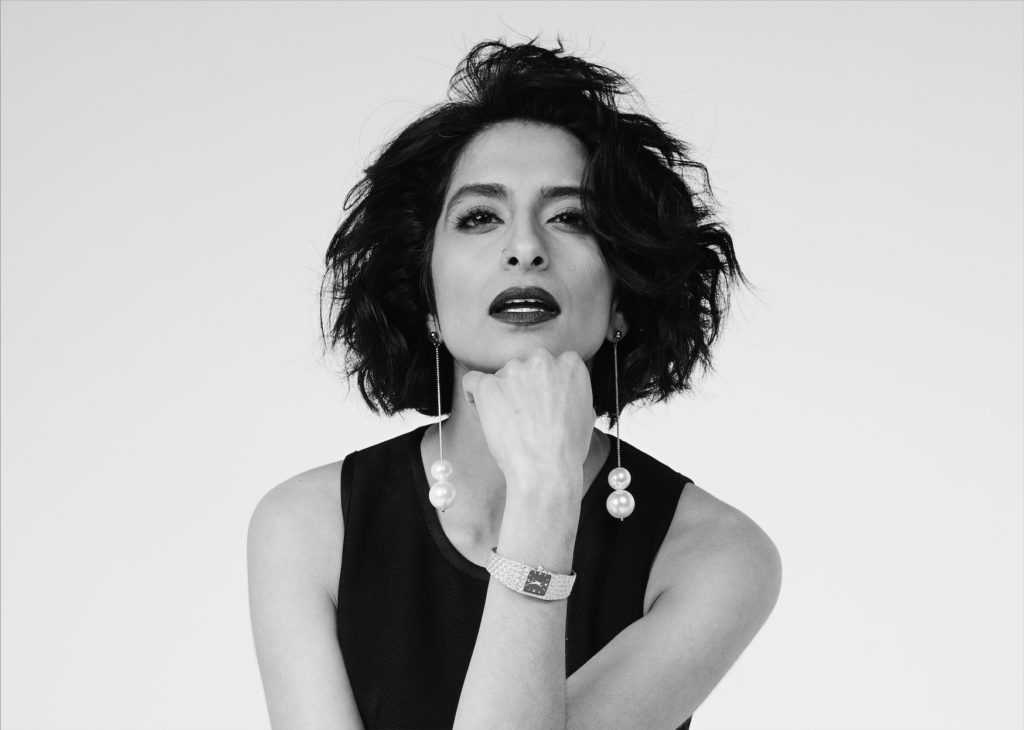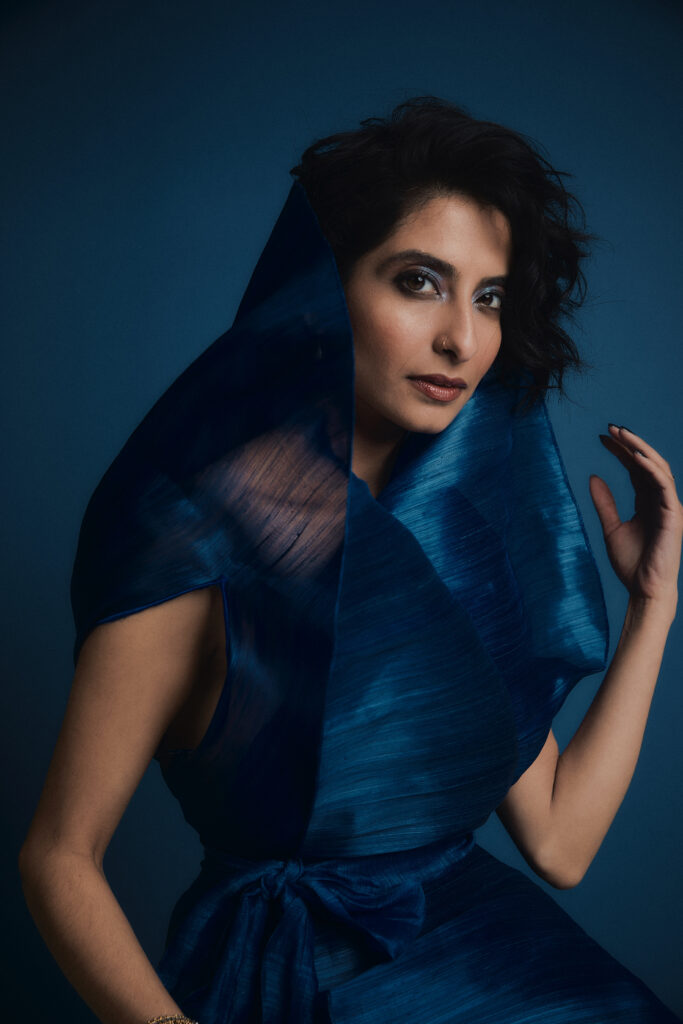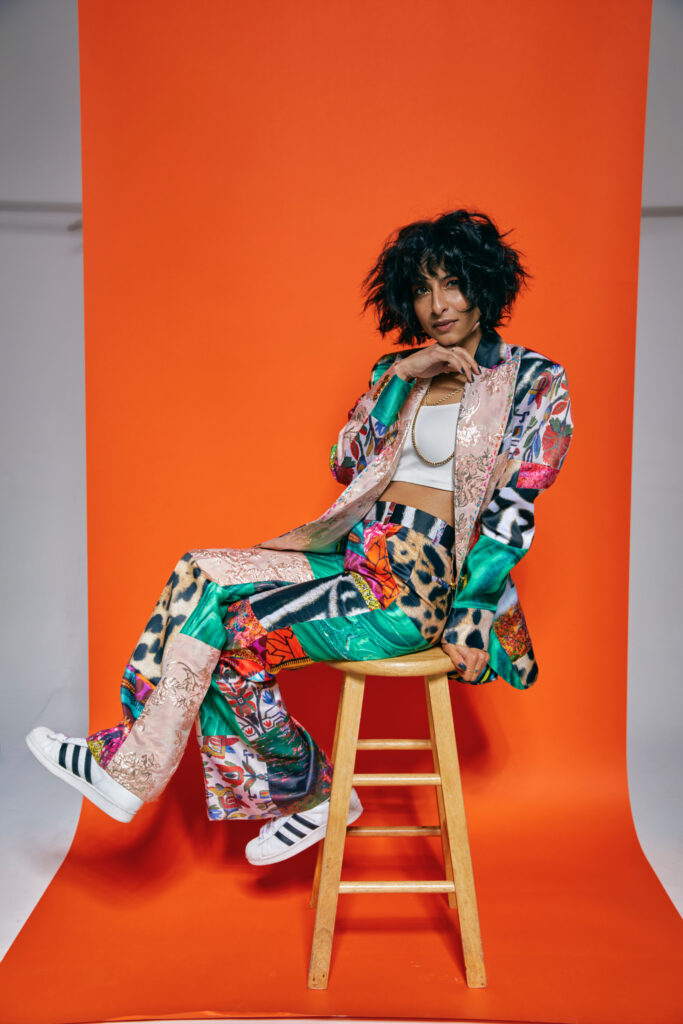LGBTQ+ Muslim/Pakistani actress and writer Kausar Mohammed has made a name for herself in the entertainment industry through her standout performances on both television and film.
Her latest project, COFFEE SHOP NAMES, is currently turning heads. Streaming on HBO MAX, Mohammed’s performance in the series has been praised for its authenticity and heart.
With her star on the rise, Mohammed is excited to be starring in the upcoming film APPENDAGE, which premiered worldwide at SXSW 2023. Additionally, she spoke on Variety’s ‘Investing in the Future of Our South Asian Stories’ South Asian House Panel during SXSW, showcasing her talent as both an actress and a voice for the South Asian community. 
Can you tell us about your experience portraying Rakhi in COFFEE SHOP NAMES?
I had so much fun working on Coffee Shop Names. The director, Deepak Sethi, is brilliant, and I got to act alongside Danny Pudi and Karan Soni who are both comedic geniuses. What’s so fun about the role is I lived in two different worlds: the normal, predictable life of Rakhi and then I BREAK OUT into a musical theatre, Belle from Beauty and the Beast’s world. We recorded a whole song! Never before have I had the experience of shooting something in the form of a musical for camera. I loved it, and it was SO fun.
As a Muslim actress, what challenges have you faced in the entertainment industry, and how have you overcome them?
Initially, it was Muslim actress co-star roles that were only stereotypical characters (sheltered teens, terrorists, fragile women) with the misconception that to be a Muslim woman, one would have to wear a hijab. I am a Muslim woman who does not wear a hijab. We exist just like my sisters who do cover, and we are all equally Muslim no matter what media wants to portray us as. At times that was frustrating because it felt like a non-Muslim person could just put on a hijab like it was some kind of accessory and suddenly appear to an exec or casting person to be more authentically Muslim than I was. I’ve learned to advocate for myself, and I must say, with larger roles there is more space for negotiation and complexity. Often the most stereotypical roles I see are the smallest ones. So, while things have gotten a little better, we still have a long way to go. Pillars Fund, Riz Ahmed’s Left Handed Films and USC Annenberg, recently did a study that found out of 8,885 TV characters studied, only 1% of them were Muslim, which is wild considering Muslims make up 25% of the global population. I dream of a world where Muslim stories are expansive, common, and normalized.
Can you discuss your involvement with SHIFT and how it has impacted your advocacy work for diversity and inclusion in Hollywood?
I am a co-founder of a racial and gender equity consulting group, SHIFT. We started back in 2017 at the height of the #metoo moment. My partners are very good friends of mine, Veline Mojarro and Natalie Bui. We were all doing work in our own separate spaces for art and activism, and we wanted to come together to bring radical conversations in workspaces. These conversations would not just be around our current systems and workplace structures but would also educate on accountability, community care, healing, and justice. There are so many folks within my community—particularly Black, Disabled, Trans, Femme, and Nonbinary people—that continuously show me what a truly equitable Hollywood could look like. It’s important to uplift and center the voices of the most impacted within our community while working towards more equitable pay structures for everyone involved, building new systems of storytelling no longer involving exploitation of others’ labor and stories. I dream of what a non-capitalist version of Hollywood could look like… no more being starving artists. We deserve to eat. All of us do, and it’s our job to take care of each other. That’s what SHIFT taught me and that’s the type of set I want to be on. I don’t know if it’ll happen in my lifetime, but I want to lay out what systems I can to support that one day.
How did you prepare for your role in APPENDAGE, and what was your experience like working with Emily Hampshire and Hadley Robinson?
For one, they are both simply BRILLIANT. The whole cast is, truly! From Brandon who plays the love interest to Desmin Borges who plays the wildly intimidating boss, I learned from every one of them. The casting process was very quick actually—but the words felt really personal to me (due to the genius of our writer/director Anna Zlokovic) and so it was so much fun popping into the live read. Casting director Lindsay Weismuller was great too. Then filming started about a week later! To prep, direct Anna and I talked a lot about the power of friendship being the heart  of the film. So often, it’s the male character who saves the poor woman, but we wanted friendship to be what pulled them through. We talked about platonic love, something I feel with my friends a lot. It’s the idea of loving them dearly, finding soulmates in them, and how those are the relationships I treasure just as much as romantic ones. Fights with friends hurt just as bad as with someone you’re dating. I dove into that through mine and Hadley Robinson’s character’s friendship and what that meant. Also, synchronously, I had started reading Farah Róisín’s WHO IS WELLNESS FOR? She’s a Bengali queer writer whom I love, and her book talks about her own experience dealing with mental illness in her family and finding herself through care. A lot of the movie touches on mental health and her book helped me explore what healing could look like on the other side. It ended up being a portal for me to my character and her backstory.
of the film. So often, it’s the male character who saves the poor woman, but we wanted friendship to be what pulled them through. We talked about platonic love, something I feel with my friends a lot. It’s the idea of loving them dearly, finding soulmates in them, and how those are the relationships I treasure just as much as romantic ones. Fights with friends hurt just as bad as with someone you’re dating. I dove into that through mine and Hadley Robinson’s character’s friendship and what that meant. Also, synchronously, I had started reading Farah Róisín’s WHO IS WELLNESS FOR? She’s a Bengali queer writer whom I love, and her book talks about her own experience dealing with mental illness in her family and finding herself through care. A lot of the movie touches on mental health and her book helped me explore what healing could look like on the other side. It ended up being a portal for me to my character and her backstory.
You have worked on a variety of projects in front of and behind the camera. What draws you to a particular role or project?
Usually, it’s the people. Who am I working with, who do I want to work with, and how do we want to be aligned? What is the project standing for? And then, it’s the role… is this role something I haven’t gotten to do yet? Do I get to explore a side of me I haven’t before? Does it make me laugh or heal me in some way? Those are the questions I ask myself.
How has your experience as a writer and performer in The Get Brown influenced your approach to acting and storytelling?
Yes! The Get Brown is an all-South Asian sketch comedy team and we used to perform a recurring show at UCB Theater in LA. Today, we’re still working together developing TV/Film projects, but I am so proud to have a group of friends and artists like them! Being with them gave me the first feeling of NOT being the only South-Asian in the room. When we came together, we got to create such specific comedy—for us, by us—other people (South-Asian and not South-Asian) related to, because of the power of specificity! It reminds me of the power of having collaborators who understand and uplift your voice, and I learn from each of them every day how to be a better storyteller. 
Could you discuss your involvement with the ViacomCBS Diversity Showcase 2021 and what it meant for you to be featured talent in it?
It was a whirlwind process I learned so much from. It was a whole mini-late night sketch bootcamp if you ask me. We brought pitches every week, and wrote sketches, then they narrowed it down to the final selections. I had so much fun filming mine, THE ASSISTANT. One of my favorite parts was meeting the other super talented cohort and my very cool mentor Claudia Lyon, who’s the head of casting at CBS. The whole process taught me a lot about trusting the process…that you’re often a piece of a larger puzzle and the whole can be more rewarding than just your little piece.
How do you think your identity as a Queer, Muslim, Pakistani actress has influenced your work and your approach to storytelling?
My identities have historically not been allowed to authentically exist on screen, especially those identities existing together. My identities motivate me to keep showing up and finding purpose in what we do. I want a young me to know they can be seen on the screen in all their multiplicity. That’s the power of media representation.
Can you discuss your upcoming panel at Variety’s South Asian House during SXSW 2023 and what topics you plan to address?
It was an amazing opportunity bringing together so many talented South Asian storytellers and folks from across the nation. I’ve never experienced anything like it. We specifically talked about South Asians creating their own stories and content. Hearing from co-panelists S. Mitra Kalita and Atit Shah was so insightful as well. One of the topics brought up that I feel particularly passionate about is our role as South Asians to be in solidarity with other BIPOC folks as we create. How can we create stories that defy the usual “model minority” stereotype, created to serve as a wedge to further uphold anti-Blackness. When we are creating, how are we thinking about equity as a whole? Who are we hiring? Who are we investing in and putting on screen with us? And how are we considering this a joint effort? Especially as South Asian Americans, so much of the progress we’ve made is due to the labor of Black creators and storytellers before us. So, as we make those beautiful moves in the representation we are currently making—from Ms. Marvelto Never Have I Ever—how are we doing it in a way that creates cohesion with other folks of color and defies the usual Hollywood bit of “every person for themself.” We are more powerful than that! Learn more about Kausar Here: Instagram | IMDb Photography by Shanley Kellis
Published by HOLR Magazine.


